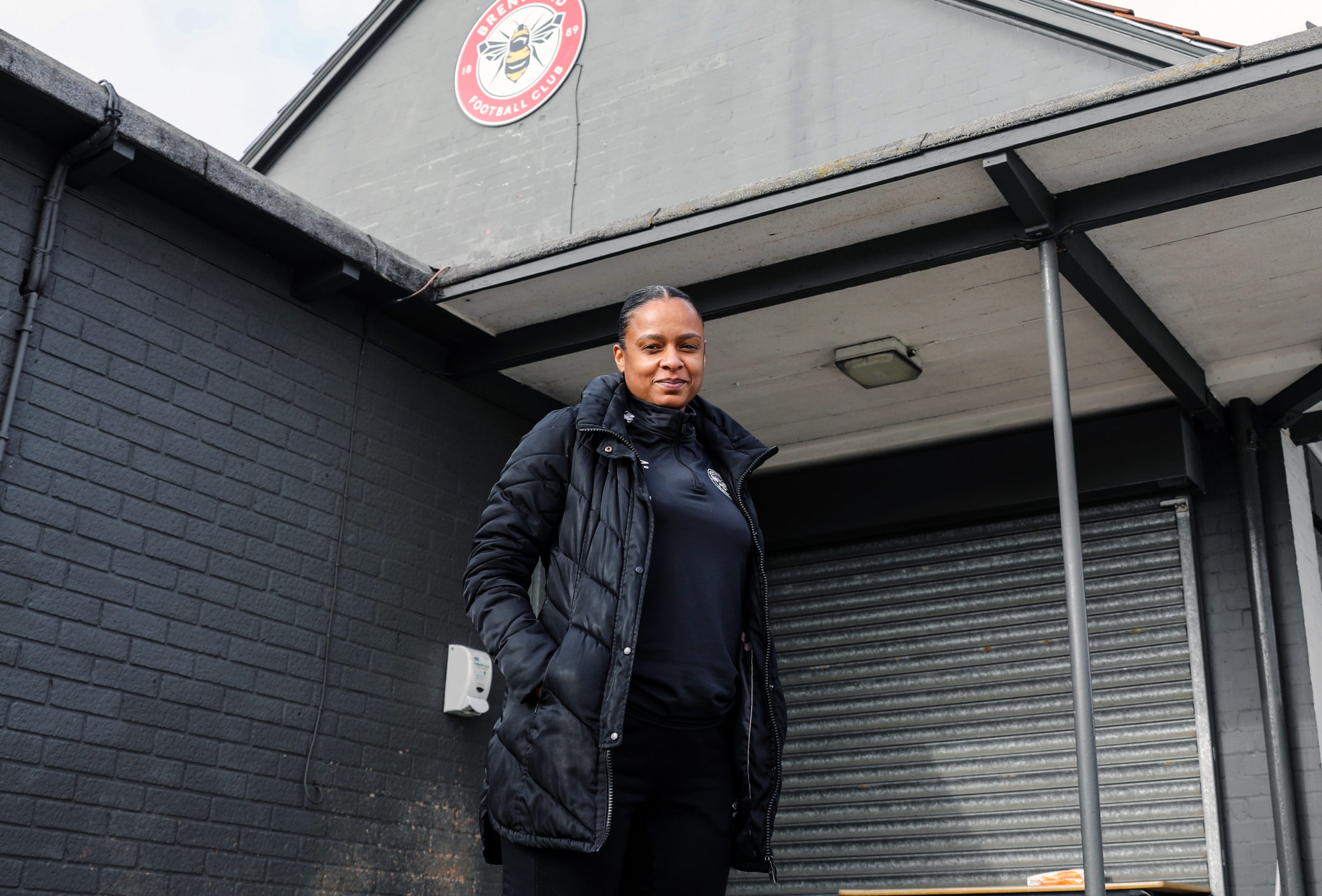In 1995 Lorna Falconer was taking a lunch break in the finance department of a London insurance company, sitting at a typewriter staring at a blank wall in a windowless office. “I thought I can’t do this for the rest of my life, but what could I do instead? I went through all the things that I enjoyed doing and one of them was going to the football”. Lorna’s next step took her down a new career path that has led to her becoming one of the few black women in a senior role in a men’s professional club.
Lorna typed a ‘very long and very passionate’ letter about football and sent it to the owner of her father’s favourite club. “I just put on the envelope ‘Alan Sugar, Tottenham Hotspur Football Club, Tottenham, London’ and I hoped it would get there”. The Spurs HR department invited Lorna for an interview, and she began to work part-time on match-days. She never met the Chairman at this stage so he never got the chance to tell Lorna ‘You’re Hired’. But when she was offered a full time job in the commercial department they met in circumstances which, all these years on, reflect well on both of them.
It began with what Lorna calls ‘one of my worst experiences’. One of her roles at Spurs was to go through the Yellow Pages, ring up local business people and invite them to the new hospitality lounge. Realising that many of them were Asian she wondered if the menu in the lounge could be amended to include halal meat and a vegetarian option.
“The commercial assistants working alongside me were so against my suggestion and I couldn’t understand why. I left the room, went to the bathroom and cried. I thought is it such a bad thing to have some Asian people or Asian food in the club? I absolutely sobbed my eyes out thinking I can’t work here”.
Mr Sugar as he was then, the Knighthood and Peerage came later, happened to be in the office that day. “As I came back from the bathroom I could hear him saying ‘where is she?’ and my heart was racing. I thought my career at Spurs is over. Daniel, his son called me into the office and he apologised on behalf of everyone else. Both Daniel and Alan Sugar completely saw my point of view in encouraging local businesses and said it was a good idea. I then stepped away from sales and worked with some of our commercial partners. It had such a big impact on my life but I don’t know if it had on theirs”.
There would be another meeting which suggests Alan Sugar stored away some memory of their encounter. In 1998 Lorna left Spurs to become as a receptionist at the Premier League’s offices working part-time to be at home more with her family. Sugar came into their offices for a meeting. “He walked in and said ‘Hello Lorna’. I thought ‘Alan Sugar knows who I am’!”.
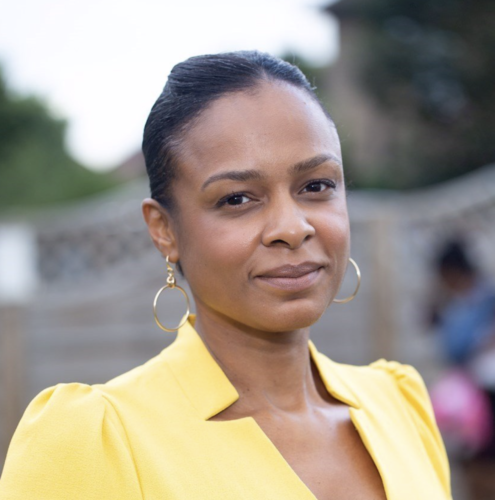
Lorna says “I had 9 fantastic years at the Premier League and was involved in many exciting and ground breaking events”. During her time at both the Premier League and then The Football League (now known as the EFL) she would often be the only black person in the room. “I would be invited to games at both Premier League and Football League clubs and often the Chairman or the CEO would be the only person I knew to talk to. Other people in the room would ask over and over again ‘who are you here with?’, ’are you related to the players?’. Another moment that had a profound affect on Lorna was when she was invited to a charity donation meeting. One of her colleagues argued that a horse charity was far more worthy of a donation than the Afro Caribbean Leukemia Trust who were trying to raise money to help save a young black boy’s life.
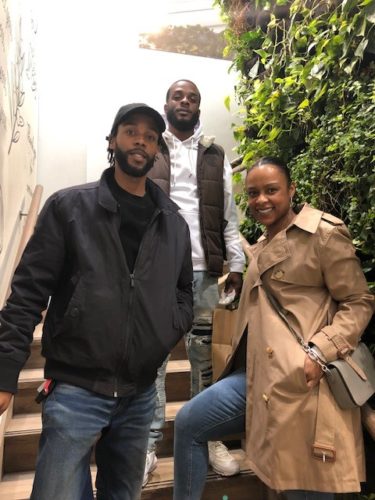
Lorna with her sons Peter and Shaun
Incidents that suggest things haven’t entirely changed for the better came earlier this season when Brentford were away at a Premier League club. Lorna was in what is called ‘the Red Zone’ under COVID rules, that’s an area closest to the pitch. “I was standing in the technical area, next to Thomas, I had a Brentford coat on and was displaying my pass. Two security men approached me in an aggressive manner and said ‘can I ask who you are?’, what is your role?’. All the other football staff were in the same area and none of them were challenged, I said ‘I am in this area stood next to Thomas Frank having already passed numerous security checks, I don’t understand what the problem is’. This caused a bit of a heated discussion and the excuses given were ‘they were just doing their jobs’. They are just not used to seeing people of colour in those areas and that is the unfortunate thing”.
Lorna came to Brentford in a change of career direction after leaving The Football League. “I wanted to be closer to football, closer to the actual game rather than the commercial side. I happened to come to a game at Griffin Park in 2015 and was told that the coaching staff at the training ground were having to do their own planning and admin and were looking for help. What I didn’t know until I was invited to meet Rob Rowan was that he was already working on the idea of appointing a logistics manager.
‘When I arrived at the training ground to start the job it was a completely different place than it is today. There were no women based at the training ground and the culture was very different, I had a really tough time. I remember going into Rob’s office and saying ‘I’m not doing this, it’s an unhealthy environment for a woman to be in’. He asked me to stick it out as things would change, he was so supportive. All this from someone who was younger than my eldest son. It wasn’t soft chats and coffee, it was very much ‘Lorna just do your job, don’t worry about anything else’.”
After Rob’s sad death in 2018 Lorna was promoted to one of his previous roles, Head of Football Operations. “I see it as very much co-ordinating the teams off the pitch and looking after and ensuring everything there is within the Club’s policies, within budgetand supports the team to get on the pitch”. But she’s keen to stress that her work doesn’t involve her ‘crossing the white lines’.
When new players have signed the paperwork to join the Club they are handed over to Lorna. “I help them to settle in off the field to get them ready for training and playing. They are sometimes just 19 years old, moving from a different country, sharing a flat with somebody they have never met before. I try to understand and manage their practical needs as well as their mental health. When players move on to another club or into a new career, the assumption is often that because they are young, fit and healthy and may have earned a good salary they should be happy. That’s obviously not necessarily true; money and happiness don’t come hand in hand, everyone is an individual and moving on can be a very challenging time for a player”.
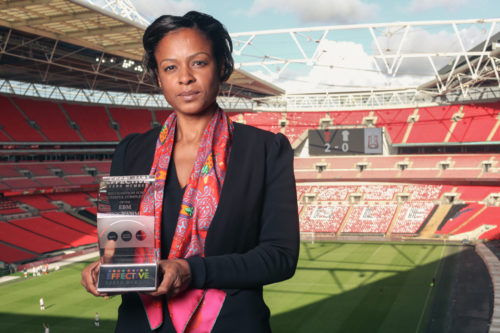
Lorna has completed an Effective Board Member course.
Lorna reports into Brentford’s Co-Director of Football, Phil Giles. “Lorna is a tireless worker, completely committed to her role and I fully support her in the important work she does. She oversees all our off site training, travel, kit and player welfare and I’m particularly grateful that as the first team’s COVID officer she has been at the front line of coping with all the new protocols. She now travels with the players to be able to manage any COVID related issues which arise”.
Brentford’s Non-Executive Director Monique Choudhuri says Lorna has been very easy to work with on many diversity and inclusion initiatives. “Lorna exemplifies so many of the Club’s values, especially humility so I think she is often under-praised for what she does. She is in a senior position and the Club trusts her.
“As a woman and a woman of colour she absolutely understands what it is like to be part of an under-represented diverse group within Brentford and football as a whole. If you ask her for a view she always has something important to offer from a different direction. It hasn’t been easy for her and I think that with her own life experiences she can help mentor people within the Club”.
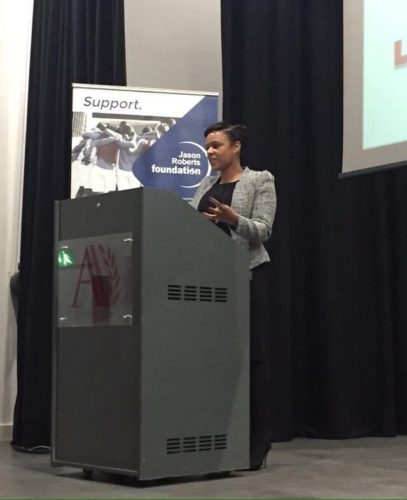
Lorna has mentored young people through her work for the Jason Roberts Foundation
Looking back on the lighter moments in her early days at the Jersey Road training ground, Lorna remembers “the biggest mistake I made was when I told Peter Gilham that my football experience started in Shepherds Bush. I went to a school close by , Aylestone, that’s now ‘Queens Park Community School’, and they were given spare tickets for games at Queens Park Rangers. Peter’s reaction was not a good one but I was able to tell him that I was never really a QPR fan. Everybody knows I was born a Spurs fan because of my Dad”.
But Lorna will admit to one dark secret: it happened because she once worked with someone who played for QPR Ladies and who invited her to football training one night. “The next day they had a match and they didn’t have enough players so for one game I signed for QPR to be on the bench. I couldn’t kick a ball to save my life”.
There is one other fact about Lorna which sounds like something out of the TV programme ‘Who Do You Think You Are’. When Rob Rowan read her CV he assumed from her name that Lorna Falconer was Scottish. Rob was from Fife and it turns out that Lorna has a connection with the East of Scotland too. In 1747 a John Falconer, a son of a Lord Falconer, travelled to Jamaica. Some of his descendants settled there. Recently a genealogist researched all the generations and established that a ‘Lorna Falconer born in Brent, England’ is the descendant of the original Lord Falconer of Halkerton. Her forefathers from Scotland had landed in a part of Jamaica where her father was born. The title of ‘Lord Falconer’ is currently vacant but the claimants apparently include a Texan truck driver so Lorna would have to join a queue.
Lorna tweets @Lorna_Football
Lorna will be part of a six person panel discussion that has been organised by Brentford to mark International Women’s Day. It will cover a range of equality, diversity and inclusion issues and will be published on the Brentford club website on March 8th 2021.

